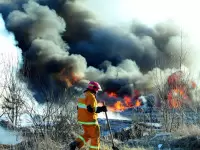
A Conservationist works in the protection of things, places, biological life and ecosystems. They are employed in a wide range of disciplines but essentially have the same job - preservation for future generations or for the health of the ecology or the planet.
What Does a Conservationist Do?
A professional Conservationist (as opposed to somebody interested in conservation) is employed in the preservation of a thing. It is a generic term that may be used in a wide range of disciplines, mostly relating to environmental sciences and environmental related areas. These include archaeology and cultural heritage (preserving built heritage and / or artefacts), ecology, of individual plant and animal species and much more. They can also become soil and plant scientists in understanding how to preserve individual elements of an ecology.
Most professionals entering into this career have two choices once within each respective field. The first is that they can work “on the ground” in interventionist roles -as conservation workers. For example, archaeological conservationists will work in labs cleaning finds from a site and taking steps to preserve them and store them for study. They may work in land clearance removing plant species that may damage built heritage.
The second choice is to become a conservation scientist. This features theory rather than practice and more lab work than working direct with artefacts, sites, biological life and ecologies. These roles are likely to include research and development of conservation materials and methods in all fields (related to biochemistry and biophysics). Conservation scientists may find more career paths open to them and a cross-disciplinary approach.
Where Does a Conservationist Work?
As “Professional Conservationist” is a broad term that can work in any field depending on their education background and discipline, the range of choices of employment opportunity depends almost entirely in which discipline the candidate is an expert conservationist. For ecology and landscape conservation, such state and Federal bodies as National Parks Service, the Forest Service, Fish & Wildlife Service, National Resource Conservation are amongst some of the largest employment opportunities.
Archaeological conservationists work in museums and at university departments and independently as consultants. Those who work independently may advise developers on preservation of historic buildings under development, or those near protected heritage areas on how to take care of sensitive areas. Archaeological landscapes are a new development in the discipline; the idea that an area of land rather than simply the monuments and extant remains within in are historically important, is key to future construction developments and understanding historic remains.
For ecology and ecologist conservation professionals, they will find many openings in government roles such as the EPA, National Parks and others charged with preserving the natural environment. Those who work with animal conservation may work at public facing centers such as zoos and aquariums (for example, breeding programs). Other choices include university departments in scientific research for soil and plant conservationists.
What Is the Average Conservationist Salary?
Conservation work can vary wildly depending on the discipline, and on where the professional chooses to work. Conservationists, who fall under the broader BLS category of conservation scientists and foresters, earned a median salary of $64,020 as of May 2020.*
Pay for conservation practitioners and workers are much lower, closer to half the salary of the equivalent scientist in each discipline. This is usually because less in the way of qualifications are required.
Conservation Jobs & Job Description
The conservationist has a nature-focused perspective that hinges on preserving the natural world. Closely linked today with resource management and sustainability practices, conservationists influence political agendas and involve the emotions of the public as they advocate for ecology. The role varies widely but conservationists may:
- Apply theoretical information to practical problems in the environment
- Ensure that everyone enjoys the benefits of a healthy ecology
- Work with other individuals and agencies (farmers, engineers, etc.) to develop conservation guidelines
- Provide technical assistance to individuals who are drafting conservation plans
- Perform evaluations of natural assets
- Prioritize the conservation of some assets based on parallel plans and development for the area in question
- Network with landowners, developers, engineers, and planners to examine land treatment
- Write articles and reports
- Hold open discussion at meetings and public forums
- Advocate on behalf of the environment; its flora and fauna
Senior conservationists are often drawn to the role for their increasing ability to create effective and elegant conservation solutions that suit many stakeholders' needs. Every project is different but senior conservationists may perform the following:
- Create strategic partnerships to improve resource management
- Continue to develop programs that address ecosystem conservation at a local, state and international level
- Identity scientific information that is useful to the case for conservation
- Continue to identify and adapt information for the conservation rhetoric so that people empathize with the environment
- Improve the ecosystem through widespread conservation planning
- Represent the conservation authority in public spaces
- Develop proactive relationships to aid attention to the cause
- Identify policy approaches that may be effective tools for conservation
- Develop employees' technical proficiency in conservation tools and methods
- Secure private and public funding streams for conservation campaigns
- Assume management responsibilities for staff members
- Integrate an evolving set of management strategies into existing teams
- Create interdisciplinary teams that can unite under a single vision of conservation
What Is the Job Demand for Conservationists?
It is expected that average demand for conservation scientist will grow around 7% between 2020 and 2030 - approximately the industry average.* Demand may vary between employer, industry, potential client and much more so it is difficult to define the potential for students and graduates to pinpoint the increase in demand. Demand for ecological conservationists, animal and botanical conservationists may grow faster than archaeological conservationists, for example.
There will always be demand for conservation workers. As many of these roles are voluntary, no data exists.
What Are the Education Requirements to Become a Conservationist?
A bachelor's degree will be suitable in most jobs, particularly where the graduate wishes to work in direct conservation. These jobs involved working with materials, artefacts, plants and animals directly. This is conservation in practice and will involve site visits, working with stakeholders, cleaning materials, clearing sites of invasive species, for example. Although conservation workers don't require formal qualifications if manual labor is all the candidate requires. However, formal training will be essential to career development - site management, project organizer or director, and sites requiring specialist knowledge would make a bachelor's degree essential in most cases.
For conservation scientists, a bachelor's (typically a BS) will be required at the very least, though candidates should realistically seek post-graduate qualifications such as MS. This will be essential to lab work and developing a core specialism. PhDs are essential for research roles and those at university departments and in private or charitable industry.
Conservation - Related Degrees
What Kind Of Societies and Professional Organizations Do Conservationists Have?
The following professional organizations are for Conservationists. Here, we present a broad choice for conservation professionals:
- National Trust for Historic Preservation: Based in DC, this is the premier group for the preservation of historic American places, the monument and sites vital to the USA's history and archaeology
- NatureServe: This private non-profit body is dedicated to the conservation of the USA's wildlife, promoting education and interventionist programs for biodiversity - this includes plants and animals
- NAEP: An international organization based in California, there conservation work focuses on ecosystems - their protection and upkeep, but also the people who live there. Economic issues are at the core of their work
*2020 US Bureau of Labor Statistics salary figures and job growth projections for conservation scientists and foresters reflect national data not school-specific information. Conditions in your area may vary. Data accessed September 2021.





